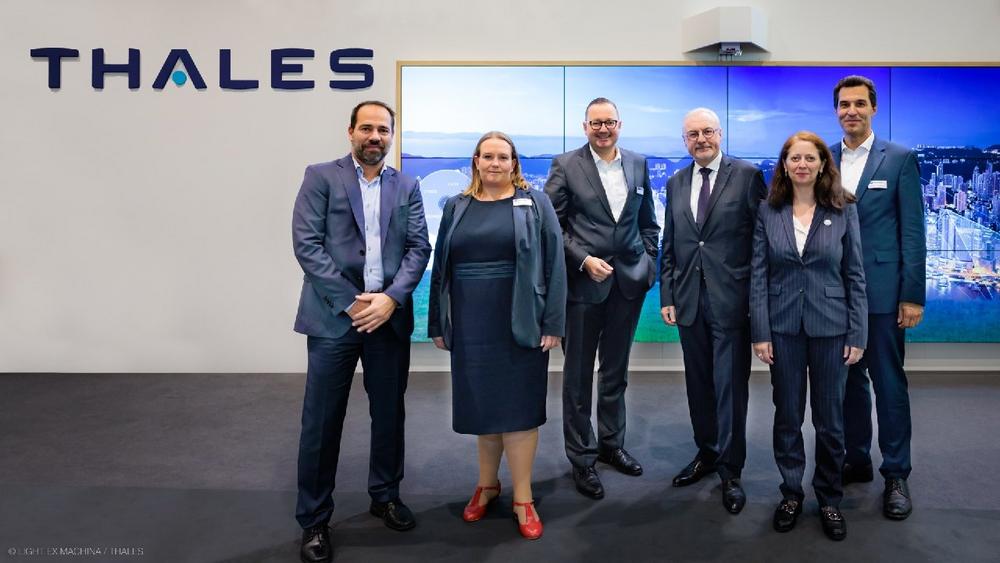
Thales and Knorr-Bremse to cooperate on freight train automation
- ▪ By bringing together their expertise in the area of Automatic Train Operation (ATO), Thales and Knorr-Bremse are looking to develop automated features for the Digital Freight Train (DFT)
▪ Automatic Train Operation will greatly assist train drivers in their daily work and thus help to counter the sector’s looming staff shortages, as well as improve rail freight’s efficiency, punctuality and competitiveness
European rail freight must become the backbone of cargo transportation to help achieve the region’s ambitious 2030 climate goals. Thales and Knorr-Bremse are setting out to increase the sector’s efficiency, competitiveness and flexibility by implementing automated digital features and functions.
Knorr-Bremse, the global market leader for braking systems and other mission-critical systems for rail and commercial vehicles, and Thales, a global leader in advanced technologies have signed a Memorandum of Understanding to cooperate on the development of Automatic Train Operation (ATO) solutions for locomotive-hauled freight and passenger trains.
“In our industry, Automatic Train Operation is a key lever for making rail freight more efficient and more available, increasing transportation capacity, and further optimizing lifecycle costs for operators”, explains Dr. Nicolas Lange, Chairman of the Management Board of Knorr-Bremse Rail Vehicle Systems. “Our partnership agreement with Thales has enormous potential for bringing about the innovations required to enable safe and smooth Automatic Train Operation and thus improve, for example, energy efficiency and punctuality.”
“Full autonomy is still a work in progress, although the necessary technologies are maturing rapidly. ATO is one of them, as a necessary step toward achieving fully autonomous driving. Thales has a clear vision for autonomy and is pleased to partner with Knorr-Bremse, a leading company in braking systems and other mission-critical train systems, with the aim of accelerating the development of automated train functions in the freight market”, adds Dr. Yves Joannic, Vice President Main Line Signalling and Managing Director Ground Transportation Systems at Thales Germany.
Automatic Train Operation (ATO) will deliver multiple benefits for the rail freight sector. These include anticipated gains in efficiency and capacity, energy savings, performance enhancements and better punctuality. Train punctuality in particular (Estimated Time of Arrival) depends on smooth, consistent train driving based on factors such as track characteristics, topography and surrounding traffic, as well as train-specific parameters such as load, which influences traction and braking performance.
Intelligent interaction to drive ATO for existing rail fleets
While many of these criteria are still monitored manually, digital and automated functions will significantly improve how they are tracked and utilized. By using sensor-based, real-time data, for example, new features will be able to deliver intelligent insights to train drivers and devise optimal driving strategies. Therefore, the smart interaction of the expertise of the two companies will be crucial. Especially in existing fleets, Automatic Train Operation will support drivers in their daily work. Among other advantages, this will help to counter looming staff shortages in the rail freight business.
With respect to 2030 climate targets, i.e. reducing transportation emissions by at least 18% (European Commission, 2020), upgrading the rail freight sector is imperative for shifting large amounts of freight from trucks and airplanes to green, rail-based transportation. Rail consumes 12 times less energy and emits up to 11 times less CO2 per passenger / ton kilometer compared with cars and trucks (IEA 2021).
Thales (Euronext Paris: HO) is a global leader in advanced technologies, investing in digital and “deep tech” innovations – connectivity, big data, artificial intelligence, cybersecurity and quantum technologies – to build a confident future crucial for the development of our societies. The Group provides its customers – businesses, organizations and governments – in the defense, aeronautics, space, transport, and digital identity and security domains with solutions, services and products that help them fulfil their critical role, consideration for the individual being the driving force behind all decisions. Thales has 81,000 employees in 68 countries. In 2021, the Group generated sales of €16.2 billion.
Knorr-Bremse (ISIN: DE000KBX1006, ticker symbol: KBX) is the global market leader for braking systems and other systems for rail and commercial vehicles. Knorr-Bremse’s products make a decisive contribution to greater safety and energy efficiency on rail tracks and roads around the world. About 30,500 employees at over 100 sites in more than 30 countries use their competence and motivation to satisfy customers worldwide with products and services. In 2021, Knorr-Bremse’s two divisions together generated revenues of EUR 6.7 billion. For more than 115 years, the company has been the industry innovator, driving developments in mobility and transportation technologies with an edge in connected system solutions. Knorr-Bremse is one of Germany’s most successful industrial companies and profits from the key global megatrends: Urbanization, Sustainability, Digitalization and Mobility.
Knorr-Bremse AG
Moosacher Straße 80
80809 München
Telefon: +49 (89) 3547-0
Telefax: +49 (89) 3547-2767
http://www.knorr-bremse.de
Head of Corporate Communications
Telefon: +49 (89) 3547-1402
E-Mail: alexandra.bufe@knorr-bremse.com
![]()



